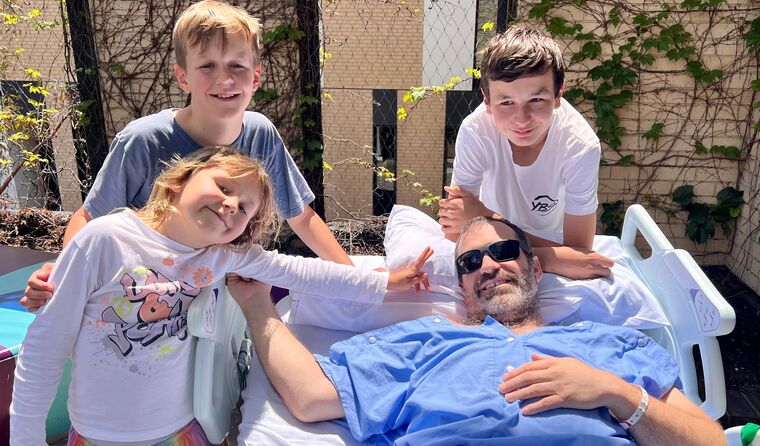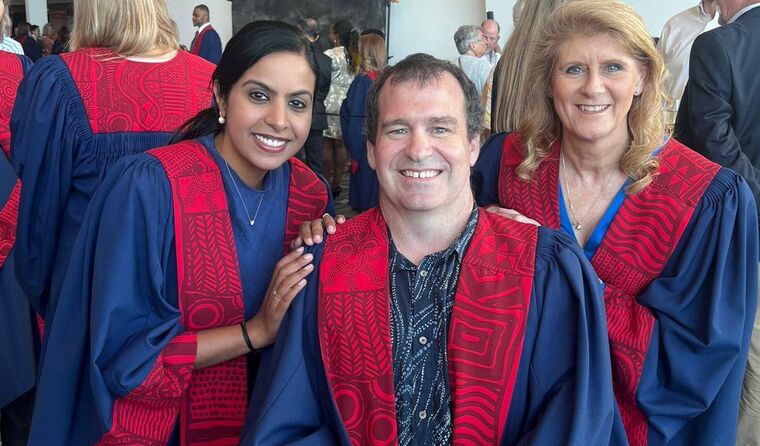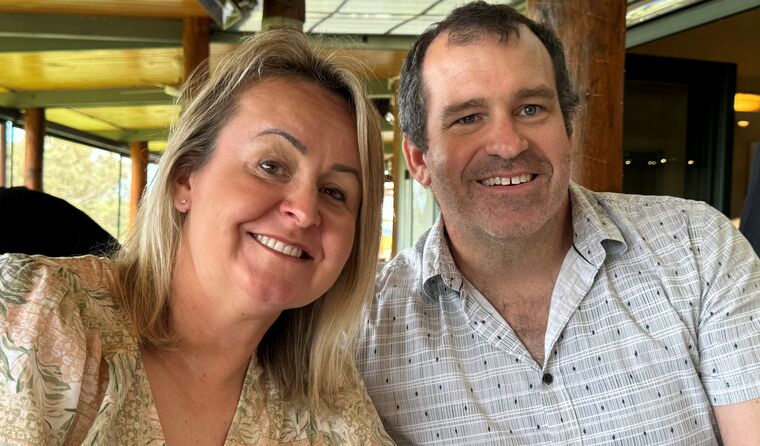Feature
The GP facing the other side of emergency care
Rural GP Dr Alex Sleeman survived falling under a two-tonne tractor and is learning to walk again, but that hasn’t stopped him, with his community’s support, from looking forwards.
 Clockwise from left: Dr Alex Sleeman fishing with his two sons before the accident; the ‘offending’ tractor; support from his colleagues during rehab. (Images supplied)
Clockwise from left: Dr Alex Sleeman fishing with his two sons before the accident; the ‘offending’ tractor; support from his colleagues during rehab. (Images supplied)
When Dr Alex Sleeman inherited a vintage 1959 tractor from his grandfather, he never could have predicted how it would change his life.
Embedded with a love for rural and emergency medicine, GP Dr Sleeman, who lives in the small rural town of Denmark in southwest Western Australia with his wife and three children, began restoring the tractor a few months ago after bringing it to his property.
The accident
One morning in October this year, after having the tractor working for around a month, Dr Sleeman was using it to pull out some old trees on his property. When the second tree didn’t give and the strap attaching the two-tonne tractor gave way, it flipped over and landed on him, pinning him down by his left foot and lower leg and creating a deep wound into the left gluteal area.
The bonnet of the tractor went up into his abdominal cavity, fracturing his pelvis, and causing a spinal injury.
Remaining conscious through it all, Dr Sleeman told his son to run to the house and grab his medical kit while they waited for emergency services. He called his close friend and fellow GP, Brett, who arrived within minutes and assisted him with pain relief until the ambulance arrived.
‘I was just in so much pain … so Brett put a couple of lines in me then started a ketamine infusion and put a pelvic binder on me for the fracture,’ Dr Sleeman told newsGP.
‘As the ambulance and firies came and lifted the tractor up so I could be slid out, Brett managed my spinal injury.’
Once in the ambulance Dr Sleeman was transported to the local Denmark Hospital, then across to the regional Albany Hospital, where a CT scan revealed the extent of the damage to his spine and pelvis. After liaising with the trauma unit in Perth, the Royal Flying Doctor Service (RFDS) was called and he was flown to the Royal Perth Hospital where he was rushed straight into surgery.
 Alex with his kids visiting him in hospital. (Image supplied)
Alex with his kids visiting him in hospital. (Image supplied)
Despite the traumatic injuries he sustained, and now having to learn to walk again, Dr Sleeman remains optimistic, saying he is ‘incredibly fortunate’ to have received the timely and expert care he did.
‘Everything about it was lucky,’ he said.
‘I had a two-tonne tractor land on me, and I’ve got, in the scheme of things, fairly minor injuries. My chest and head weren’t crushed which would have killed me instantly.
‘Albany Hospital doesn’t have an orthopaedic surgeon, they have a rotation of guys that just come down five or six days at a time. When I got there, the guy who was on rotation … his usual job is one day a week in the trauma unit at Royal Perth, so I was fortunate to have him.
‘The RFDS picked me up straight away, I went straight into surgery, and there was a mix up with rostering that weekend, so instead of having a consultant surgeon and his registrar, there was no registrar – so I had the consultant and he called in his mentor. He’s like one of the gurus of spinal surgery here in Western Australia.
‘I couldn’t get luckier in everything that happened along the way, on so many fronts … and couldn’t have asked for a better team to look after me from the moment someone rocked up and helped me under the tractor, right through to when I came out of surgery.’
After three hours of surgery to fix his spine, a rod was placed at either side, secured at L2, L3, L4, L5 on each side, ‘fusing’ his lumbar spine.
A true rural generalist
A well-known and respected rural GP serving his WA community, Dr Sleeman and his family made the 400-kilometre move from Perth to Denmark six years ago.
‘I was working as a city GP, then I just felt there was more to offer, that I could extend myself,’ he said.
‘I also really love doing ED work, and going rural meant I could do general practice and emergency at the same time. The city life is a hustle and bustle, and [my wife and I] thought a move to the country would be more laid back, we’d have a bigger house and more space. The best of both worlds.’
On 24 November, Dr Sleeman was one of 20 GPs to be awarded Rural Generalist Fellowship at an RACGP ceremony in Perth, attending in a wheelchair after his accident, alongside family, friends and colleagues.

(L–R) RACGP Vice President and WA Chair Dr Ramya Raman, rural generalist Dr Alex Sleeman, and RACGP WA Director of Training Dr Colleen Bradford, at the recent WA Fellowship ceremony. (Image supplied)
The value of a positive mindset
After the tractor accident, Dr Sleeman spent nine weeks lying flat in a hospital bed while his gluteal wound healed.
As his recovery progressed and the weeks passed by, he was allowed to sit up, and eventually began using a wheelchair.
‘Because my body wasn’t used to sitting up, a lot of muscles have wasted away. And now I’m starting rehab where I can try and learn to walk again,’ he said.
But facing such an enormous setback has not dampened Dr Sleeman’s spirits, having taken it on as a challenge, rather than a threat, and remaining forever grateful for the support he has received.
As part of his rehab, Dr Sleeman attends regular education sessions including from the team psychologist.
‘He was talking about treating spinal cord and other big injuries, and said that people take it in two ways: they either see them as a challenge or as a threat,’ he said.
‘And if they see it as a challenge, they’ll tend to go really well, because they’ll think, “I’ve just got to do this”. Whereas those who see it as a threat have the fight or flight response and they shut down, then their mental health deteriorates.
‘What he said really resonates with me, because everything along the way has been a challenge, but that mindset has got me through. Every obstacle is just another challenge that I’ve just got to get through, got to defeat it.
‘The physio comes in and says, “Let’s do three sets of 10 walking along the bar”, and I’ll say, “Nah, let’s do four sets of 20”, or they’ll say, “Let’s walk up the bars and back” and I’ll say, “Let’s do it twice”.’
 Alex with his wife Agata at his dad’s recent 80th birthday. (Image supplied)
Alex with his wife Agata at his dad’s recent 80th birthday. (Image supplied)
When the doctor becomes the patient
The accident led to yet another unexpected encounter for Dr Sleeman – being on the receiving end of emergency care, rather than the provider of the care he is so passionate about.
But after experiencing firsthand a medical emergency, he believes his experience will change the way he delivers care in the future.
‘It is weird to be on the receiving end, and I was the worst patient ever to begin with, because I was used to managing this sort of stuff, and thought I was in control,’ Dr Sleeman said.
‘It took a good friend up here who visited me and basically kicked me in the bum and said, “No, you’re the patient, you’ve got to let these people do their job”.
‘We manage spinal injuries in the ED then send them off to someone else – I don’t know anything about that someone else, but now I’m in a position where all these people here do spinal injury day in, day out, so I just let them do their job.
‘But at the same time, I’m medically trained, I’m an educated patient, so I can make suggestions and so on, but now whatever the doctors and nurses say, I know they’re just doing their job and they know what they’re doing.’
While he has always known communication is important, Dr Sleeman’s experience has made him realise to never underestimate its power.
‘Having people talking to you along the way, especially in the early stages like when I was lying under the tractor, on that ambulance stretcher, just having someone come and chat to me and tell me what they’re doing now, that it’s not going to be long – that continuous flow of information was so good,’ he said.
‘When I got to the hospital, my mate Brett was still there and the doctor and senior nurses who came in were all people I knew.
‘And just hearing those familiar voices was so reassuring … you can’t imagine how nice it is to hear a voice that you recognise and think, “Everything’s gonna be okay”.
‘I’ve always known communication is important, but now being on the receiving end, I just want people to just tell me what’s going on.
‘It will change how I work because I now understand people need to know what’s happening, to be kept informed … so I will talk to people the whole way now, because that’s what you need when you have a vulnerable patient.’
Today, Dr Sleeman anticipates he has another few months’ worth of rehab, learning to walk and recover from his injuries.
He remains extraordinarily pragmatic, upbeat and grateful.
‘By late January, maybe February, I might get out of here,’ he said.
‘There’s a long way to go but I’m staying positive, because everything’s positive: I’ve got the best care, it’s all going really well.’
Log in below to join the conversation.
emergency medicine farming accident rural generalist rural GP Western Australia
newsGP weekly poll
Which of the following areas are you more likely to discuss during a routine consultation?